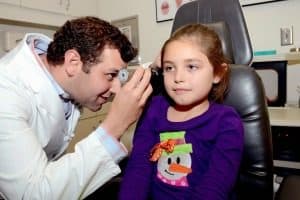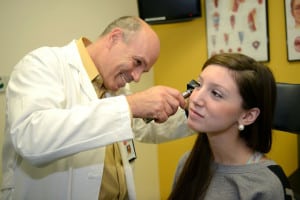If your child has severe to profound hearing loss and gets limited or no benefit from hearing aids, it may be the right time to consider a cochlear implant. Our skilled physicians at Pediatric ENT Associates (PENTA) at Children’s of Alabama in Birmingham, AL have the training and experience necessary to diagnose and treat your child’s medical ear condition. At our otolaryngology clinic, our doctors specialize in conditions such as hearing loss and provide the most advanced care for children requiring cochlear implants while helping you make informed decisions about your child’s health and future.
How Do Cochlear Implants Help with Hearing Loss?

Qualifications for a Cochlear Implant
The pediatric ENT specialists at our Birmingham otolaryngology clinic will help you decide if your child is a good candidate for cochlear implants.
A child being considered a candidate for surgery will:
- Undergo a medical evaluation by an otolaryngologist. This includes relaying a full medical history, physical examination, and imaging studies of the inner ear and the bones surrounding it. The patient should have an intact tympanic membrane, should be free of active ear disease, and be an acceptable candidate for general anesthesia.
- Undergo speech/language tests
- Temporarily use a hearing aid to determine if it helps
A child might not be eligible if:
- They can hear sound and speech with the help of hearing aids.
- Their hearing loss isn’t caused by a damaged cochlea.
- They’ve had profound hearing loss for a long time.
- Their auditory nerve is absent or damaged.
Pros and Cons of Cochlear Implants
Considering a cochlear implant’s pros and cons should help you weigh your options and determine what is best for your child.
Pros:
- Improved hearing – Cochlear implants can provide a dramatic improvement in the hearing and speech perception of your child.
- Enhanced speech development – Cochlear implants can help improve speech clarity, listening, and spoken language skills.
- Enhanced opportunities – Cochlear implants can help your child participate in a broader range of educational settings, helping to open doors to more career opportunities in the future.
- Safety – Cochlear implants can give your child the ability to hear or identify potential dangers or important alerts such as sirens and alarms.
Cons
- Surgery – While it’s a safe procedure, all treatments come with certain risks. Potential side effects of surgery include bleeding, infection, irritation, numbness, and facial paralysis. These manifest on a case-to-case basis and are usually temporary.
- Cost – This type of device can be expensive. However, insurance providers may cover the full cost.
- Training – Hearing is not automatic. Your child will need time and training to learn how to connect new sounds with their meaning. They will still need support in hearing and communication, especially in places with lots of background noise.
- Varied results – Outcomes will differ for everyone. Every child is unique and will not receive the same benefits. Some may only experience minimal improvement.
- Maintenance – Cochlear implants require constant care and maintenance, including changing the batteries daily, cleaning, monitoring the device, and keeping up with programming appointments.
The Importance of Timing

Life with Cochlear Implants
A cochlear implant is not a cure but a tool that your child must learn to use. After your child receives a cochlear implant, follow-up visits are required for at least one year following the surgery. Listening, speech, and language therapy once a week will be needed as well. There are also education and training programs you can take to learn the best ways to support your child. All these efforts along with cutting-edge technology can help restore the gift of sound, enabling your child to hear again and live a relatively normal life.
Schedule a Hearing Evaluation at our Otolaryngology Clinic Today
Cochlear implants may help open up a world of possibilities for you and your child. To learn more about hearing loss and the available surgical treatment options, you can make an appointment with Pediatric ENT Associates at Children’s of Alabama in Birmingham, AL by contacting us at (205) 831-0101.


